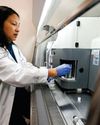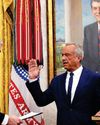
Geoffrey Hinton
EMERITUS PROFESSOR | UNIVERSITY OF TORONTO
EVER THE COURSE OF February, Geoffrey Hinton, one of the most influential AI researchers of the past 50 years, had a "slow eureka moment."
Hinton, 76, has spent his career trying to build AI systems that model the human brain, mostly in academia before joining Google in 2013. He had always believed that the brain was better than the machines that he and others were building, and that by making them more like the brain, they would improve. But in February, he realized "the digital intelligence we've got now may be better than the brain already. It's just not scaled up quite as big."
Developers around the world are currently racing to build the biggest AI systems that they can. At the current rate these models are growing, it could be less than five years until AI systems have 100 trillion connections-roughly as many as there are between neurons in the human brain.
Alarmed, Hinton left his post as VP and engineering fellow in May and gave a flurry of interviews in which he explained that he had left so he could speak freely on the dangers of AI-and on his regrets over helping bring that technology into existence. He worries about what could happen once AI systems are scaled up to the size of human brains and the prospect of humanity being wiped out by the technology. "This stuff will get smarter than us and take over," says Hinton. "And if you want to know what that feels like, ask a chicken."
THE HUMAN BRAIN always fascinated Hinton, who was born and raised in England. As a Cambridge University undergraduate, he tried a range of subjects-physiology, physics, philosophy-before graduating with a degree in experimental psychology in 1970. Two years later he started a Ph.D. in AI at the University of Edinburgh.
Diese Geschichte stammt aus der October 09, 2023-Ausgabe von Time.
Starten Sie Ihre 7-tägige kostenlose Testversion von Magzter GOLD, um auf Tausende kuratierte Premium-Storys sowie über 8.000 Zeitschriften und Zeitungen zuzugreifen.
Bereits Abonnent ? Anmelden
Diese Geschichte stammt aus der October 09, 2023-Ausgabe von Time.
Starten Sie Ihre 7-tägige kostenlose Testversion von Magzter GOLD, um auf Tausende kuratierte Premium-Storys sowie über 8.000 Zeitschriften und Zeitungen zuzugreifen.
Bereits Abonnent? Anmelden

NIH budget cuts are causing chaos
THE U.S. NATIONAL INSTITUTES OF HEALTH (NIH) IS THE largest funder of biomedical research in the world, and its grants create the foundation of basic science knowledge on which major health advances are built.

Zero Day's uncannily apolitical Washington
IN AN EARLY SCENE OF THE NETFLIX THRILLER ZERO DAY, a former U.S. President is visiting the site of a deadly Manhattan subway crash when an onlooker starts shouting about crisis actors.

For the love of voice notes
SOMEWHERE IN THE BLUR OF 2020, AS I SLIPPED OUTside with a mask and running shoes in the early morning to walk around the block, the lilting drawl of a friend's \"Hiiiiii\" nearly stopped me in my tracks.

Robert F. Kennedy Jr.As the U.S. Health Secretary
THE SENATE CONFIRMED ROBERT F. Kennedy Jr., one of country's most notorious vaccine skeptics, to run the U.S. Department of Health and Human Services (HHS) on Feb. 13, sparking outrage among public-health experts who worry that Kennedy will harm public health and further erode trust in science and medicine.

THE RISE OF GERMANY'S FAR RIGHT
Alice Weidel's AfD party is making gainswith a boost from the Trump Administration

Net Zero Is Not Enough
AUSTRALIAN MINING BILLIONAIRE ANDREW FORREST'S GREEN CRUSADE

How will your new company, Respin, help women in menopause?
Halle Berry The Oscar-winning actor says there’sa desperate need to inform women about menopause. Her new company aims to fill that education and empathy gap

How we talk about the Holocaust now
VICE PRESIDENT J.D. VANCE ARRIVED AT THE DACHAU concentration camp under low, gray clouds.

South Korea's political drama will produce waves overseas
SOUTH KOREA'S political crisis continues. After President Yoon Suk-yeol was impeached and arrested following his aborted imposition of martial law last December, the country's Constitutional Court will now decide his future. Legal experts say Yoon will soon be removed from office and sent to prison.

WOMEN of the YEAR
13 extraordinary leaders fighting for a more equal future